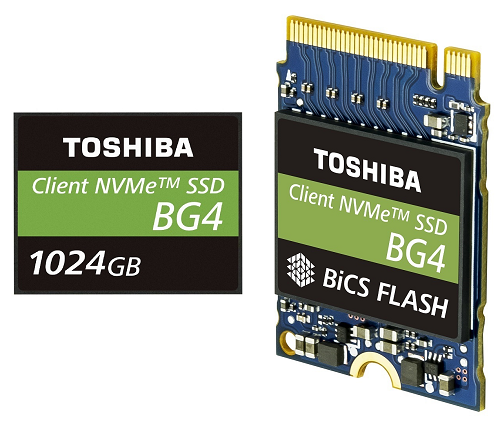Today at CES 2019, Toshiba Memory America, Inc., the U.S.-based subsidiary of Toshiba Memory Corporation, will introduce the fourth generation of its single package ball grid array (BGA) solid state drive (SSD) product line: the BG4 series. Toshiba Memory’s new lineup of ultra-compact NVMe SSDs places both the flash and an all-new controller into one package, bringing design flexibility to ultra-thin PC notebooks, embedded systems and server boot in data centers.

“The BGA form factor SSD enables larger amounts of flash to be added to smaller and thinner devices and extends battery life to improve the mobile experience,” said Jeff Janukowicz, research vice president, Solid State Drives and Enabling Technologies at IDC. “NVMe BGA solutions, such as the new Toshiba BG4 series, provide OEMs with a better-than-SATA storage option that boosts demand for client SSD units. In fact, we expect this demand to increase at a 2017-2022 CAGR of 14 percent.”
Toshiba Memory Corporation has long been at the forefront of delivering SSDs that enable smaller, thinner, lighter, and more power efficient mobile designs. The company was the first to develop a single package PCIe SSD, and the introduction of the fourth generation BG series represents another pioneering achievement as the densest client SSD by volumetric measurements. Utilizing Toshiba Memory’s innovative 96-layer BiCS FLASHTM 3D memory, BG4 increases the maximum capacity from 512 gigabytes to 1024GB (approximately 1TB) and provides a slim 1.3mm profile for capacities up to 512GB4. Furthermore, the BG4 series doubles the PCIe Gen3 lane count from 2 to 4, delivering more performance in the same power envelope when compared to the prior generation product.
Performance improvements5 over the BG3 series include:
- Up to 2,250 megabytes per second sequential read (50 percent improvement) and up to 1,700MB/s sequential write performance6 (70 percent improvement)
- Up to 380,000 random read IOPS (153 percent improvement) and 190,000 random write IOPS7 (90 percent improvement)
“When it comes to performance, the BG4 series bests client SATA drives by a factor of up to 4x8,” said Alvaro Toledo, vice president, SSD marketing and product planning for Toshiba Memory America, Inc. “Better performance, along with its optimized power consumption and compact footprint, is why the BG4 SSDs are rapidly replacing SATA SSDs in notebook and desktop PCs.”
BG4 SSDs feature a power-saving solution that improves power efficiency up to 20 percent in read and 7 percent in write9 and provides a low-power state 10 as low as 5mW (when compared to the BG3 series). The BG4 also improves its Host Memory Buffer (HMB) technology by increasing the accelerated read access range and optimizing background flash management. Additionally, BG4 includes new enhanced reliability features to protect against host DRAM failures when using the HMB feature.
“By continuously pushing the envelope of what is possible with flash and SSD technology, we are arming OEMs with the technology they need to gain a competitive advantage,” said Neville Ichhaporia, senior director of client and data center SSD marketing for Toshiba Memory America, Inc. “With BG4, we’re elevating the end-user experience with upgraded storage capacity and significantly improved performance, while continuing to make power efficiency a priority.”
Providing essential options for today’s mobile devices, Toshiba Memory’s new single package SSD is available in capacities of 128GB, 256GB, 512GB, and 1024GB (1TB), in either surface-mount BGA M.2 1620 (16 x 20mm) or removable M.2 2230 (22 x 30mm) modules. Pyrite drive (version 1.00) or self-encrypting drive (TCG Opal version 2.01) models11 are also available.
Toshiba Memory Corporation offers the industry’s broadest SSD portfolio, including a wide array of client SSDs. The BG4 series is currently sampling to select OEM customers, with general sample availability expected later in the second calendar quarter of 2019. Toshiba Memory America, Inc. will showcase the BG4 series in its private demo suite at the Venetian Resort from January 8 – 11.
For more information, please visit www.toshiba.com/tma.

